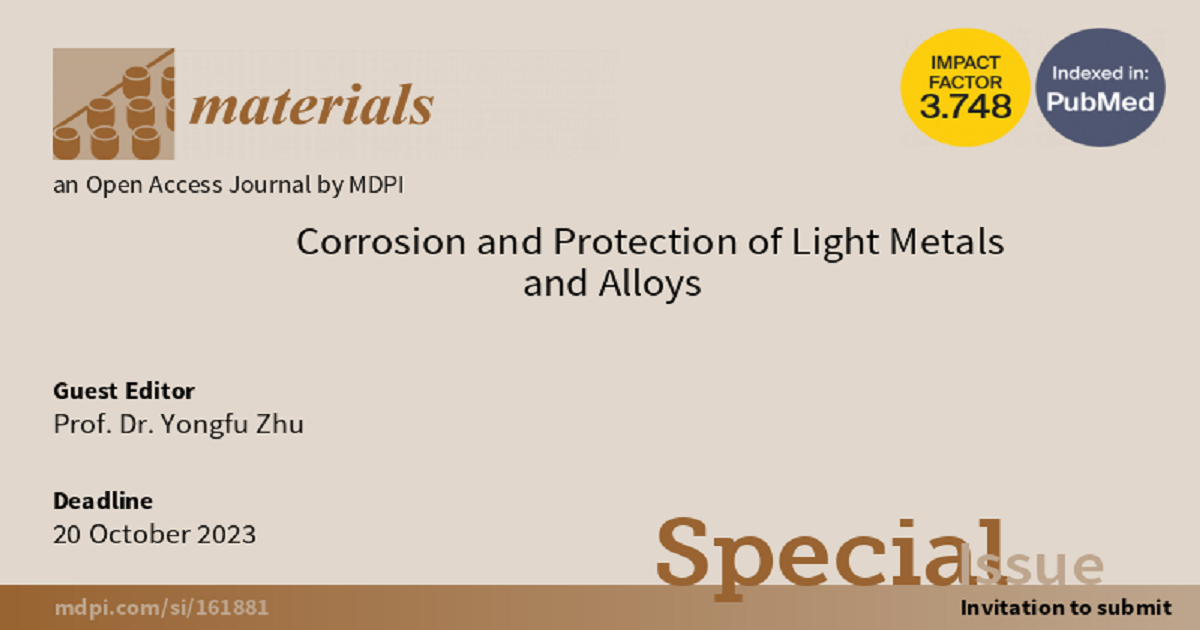Corrosion and Protection of Light Metals and Alloys
A special issue of Materials (ISSN 1996-1944). This special issue belongs to the section "Corrosion".
Deadline for manuscript submissions: closed (20 October 2023) | Viewed by 341

Special Issue Editor
Interests: alloys; corrosion; film; corrosion mechanism; heat treatment; oxidation
Special Issues, Collections and Topics in MDPI journals
Special Issue Information
Dear Colleagues,
Light metal materials, including Mg, Al and Ti and their alloys, have received much attention because of their potential application in aerospace, rail transit, biomedical and electrical electronics. Due to the very low electrochemical potential of Mg, however, the self-generated protective film is loose and porous, not protective, making it highly susceptible to corrosion under both high-temperature and salt spray conditions. Regarding Ti and Al, although the surface is prone to the formation of a passivation film, it does not block the destruction of Cl- under marine conditions, leading to crevice or pitting corrosion.
Against this backdrop, this Special Issue aims to collect original research and comprehensive review papers to understand information on the corrosion and protection of light metals and their alloys, such as micro-arc oxidation, surface coating, ion implantation, alloying, etc. Contributions to this Special Issue are welcome.
Prof. Dr. Yongfu Zhu
Guest Editor
Manuscript Submission Information
Manuscripts should be submitted online at www.mdpi.com by registering and logging in to this website. Once you are registered, click here to go to the submission form. Manuscripts can be submitted until the deadline. All submissions that pass pre-check are peer-reviewed. Accepted papers will be published continuously in the journal (as soon as accepted) and will be listed together on the special issue website. Research articles, review articles as well as short communications are invited. For planned papers, a title and short abstract (about 250 words) can be sent to the Editorial Office for assessment.
Submitted manuscripts should not have been published previously, nor be under consideration for publication elsewhere (except conference proceedings papers). All manuscripts are thoroughly refereed through a single-blind peer-review process. A guide for authors and other relevant information for submission of manuscripts is available on the Instructions for Authors page. Materials is an international peer-reviewed open access semimonthly journal published by MDPI.
Please visit the Instructions for Authors page before submitting a manuscript. The Article Processing Charge (APC) for publication in this open access journal is 2600 CHF (Swiss Francs). Submitted papers should be well formatted and use good English. Authors may use MDPI's English editing service prior to publication or during author revisions.
Keywords
- corrosion resistance
- oxidation resistance
- magnesium
- aluminium
- titanium
- alloys
- crevice corrosion
- pitting corrosion
- electrochemical impedance spectroscopy
Benefits of Publishing in a Special Issue
- Ease of navigation: Grouping papers by topic helps scholars navigate broad scope journals more efficiently.
- Greater discoverability: Special Issues support the reach and impact of scientific research. Articles in Special Issues are more discoverable and cited more frequently.
- Expansion of research network: Special Issues facilitate connections among authors, fostering scientific collaborations.
- External promotion: Articles in Special Issues are often promoted through the journal's social media, increasing their visibility.
- Reprint: MDPI Books provides the opportunity to republish successful Special Issues in book format, both online and in print.
Further information on MDPI's Special Issue policies can be found here.






